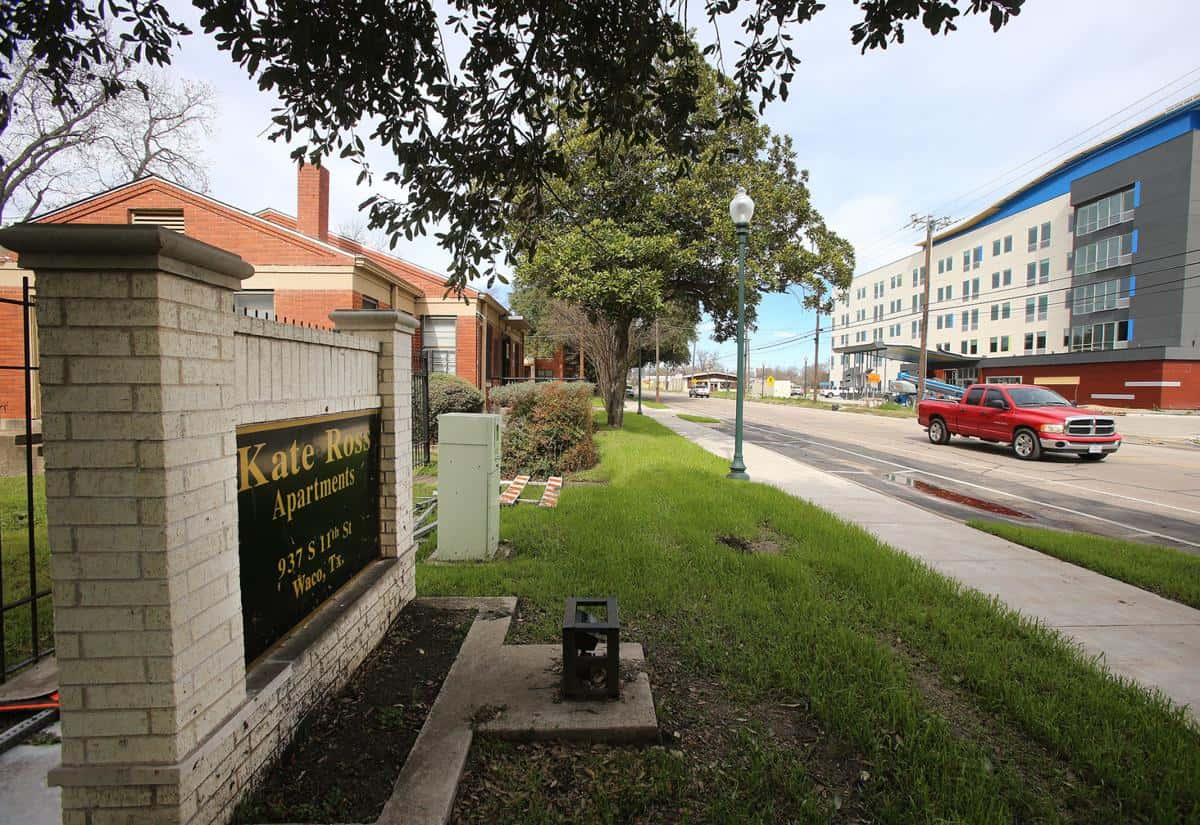
Kate Ross Homes, Waco’s grande dame of subsidized housing, finds itself in limbo between the wrecking ball and temporary fixes. Federal money arrives yearly to keep it, Estella Maxey Place and South Terrace Apartments viable as home to more than 900 low-income individuals who struggle to stay financially afloat.
At issue now is spending money that dribbles in from federal sources while hoping for a long-term solution, one that could include putting the units in the hands of a nonprofit and offering tax credits to investors.
Knocking down the units and building new ones seems folly for now.
Toss into this volatile mix Kate Ross Homes’ enviable location at 11th Street and Interstate 35, an area pulsating with development potential. The nearby West Bay mixed-use center is pursuing retail and restaurants. La Quinta opened in the neighborhood, and an Aloft hotel will follow suit. Row after row of fast-food restaurants flank Kate Ross to the north. And TFNB Your Bank for Life has opened its cavernous new downtown banking center nearby.
“This would be a great opportunity if we were just in the business of selling real estate, but that’s not what we’re in,” said Milet Hopping, Waco Housing Authority executive director.
In a phone interview, Hopping said she has fielded many offers and inquiries, but fewer these days, as would-be investors realize what it would cost to buy Kate Ross, build new subsidized housing elsewhere, find temporary accommodations for displaced residents and then demolish Kate Ross to proceed with projects.
In late 2018, Waco Housing Authority considered a move toward privatization that could mean leveling and replacing all three housing complexes at the same sites. A consultant ultimately recommended renovation for one complex, and demolition and reconstruction for the other two, but any demolition now appears unlikely.
Crunching the numbers for South Terrace, on Kennedy Circle, proved sobering. Knocking down the complex and replacing it with new construction would cost $50 million to $55 million, almost three times the tab for rehabbing the property from top to bottom, Hopping said. There would be no way to finance such debt using rent rolls at a Section 8 housing complex.
“I won’t say everything is off the table, but I’m dubious that could be supported,” Hopping said.
The housing authority is working with consultants and a developer to weigh its options for each complex, she said.
“To get approval to demolish, we have to prove to Housing and Urban Development that the units are obsolete or facing imminent safety factors to residents,” Hopping said by email. “The properties are still leasing and so far we do not know of any imminent safety factors to residents that are unrepairable. I think this type of discussion (demolition) might have been prior to costs for rehabilitation were compared to costs for new construction.
“New construction is about three times the cost of rehabilitation and would not be a debt any property could carry long-term.”
Meanwhile, Waco Housing Authority must weigh new issues facing Kate Ross Homes as Interstate 35 is widened from North Loop 340 in Bellmead to South 12th Street at a cost of $341 million.
Hopping said she has learned the I-35 widening could have implications for Kate Ross Homes and its proximity to an area where flooding is a possibility. That would impact what the Waco Housing Authority “could and could not do with a certain number of units, what could be done for Kate Ross to sustain itself.”
Though faced with uncertainties, Kate Ross Homes residents could benefit from the changing landscape in the long-run. They will find themselves living in a dynamic area that stands to see more development as work on I-35 winds to a close by late 2022 or early 2023, bringing with it more dining, shopping and entertainment options and employment opportunities.
Waco Housing Authority remains committed to participating in a federal initiative, the Rental Assistance Demonstration program, which provides funds to convert public housing into privately managed units that use Section 8 housing vouchers, Hopping said. With HUD approval, the Housing Authority’s designated nonprofit would become owner of the land and buildings that make up the three subsidized housing complexes. The Waco Housing Authority would serve in a supervisory capacity, according to Tribune-Herald reporting in 2018, when the Housing Authority went public with the initiative.
A private investor could manage day-to-day operations.
“We hope to have our 4% tax credit application in to the Texas Department of Housing and Community Affairs on March 5. This is for the South Terrace site,” Hopping said. “If we are approved at this level, we will then need to be approved at the HUD level and then hope to close in July for South Terrace only. We hope to begin working on Estella Maxey and thereafter, Kate Ross.”
South Terrace is the agency’s smallest property, built in the 1970s.
The RAD program, by providing tax credits to would-be investors, would benefit entities striving to upgrade low-rent housing.
For now, the Waco Housing Authority makes do with what HUD sends it. HUD awarded the local agency a $2 million grant this month, part of a $2.7 billion allocation to similar entities nationwide. Hopping said the money will be spread among the three housing units, targeted at safety priorities “such as stairwells, landings, electrical boxes and roofs.”
“We have received these funds every year,” Hopping said.
That will not make a big dent in needs, but Hopping appreciates it.
HUD, in a press release on the $2.7 billion allocation to 2,900 public housing authorities, also commented on the RAD program introduced in 2011.
“Early results show it is generating significant additional capital for distressed public housing,” according to the press release. “As a result, 130,000 public housing units have converted to a more sustainable Section 8 financing platform, all without any additional costs to taxpayers. Public housing authorities and their partners have generated over $8.6 billion to preserve or replace distressed units and support local jobs in their communities — all without additional federal resources.”
— WACOTRIB
